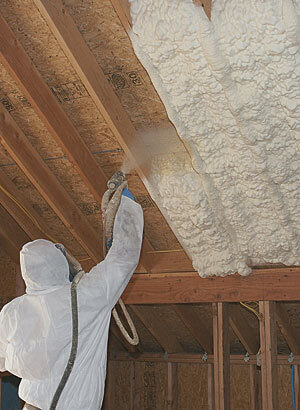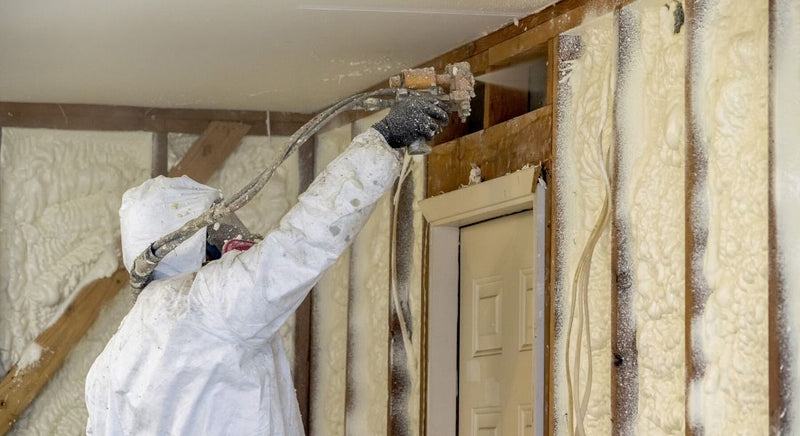Spray Foam: The Ultimate Service for Air Sealing and Insulation
Spray foam insulation has arised as a leading solution for efficient air sealing and thermal insulation, using a special mix of residential properties that establish it apart from traditional techniques. Its capacity to broaden and load spaces makes it especially reliable in preventing air leakage, which can substantially influence power performance. Comprehending the full range of its advantages, installment procedures, and contrasts with various other insulation kinds is important for making informed decisions. As we check out these aspects, the ramifications for both brand-new constructions and retrofits end up being progressively substantial. What aspects should influence your choice?
What Is Spray Foam?
Spray foam is a flexible insulation material that integrates the principles of air sealing and thermal resistance to enhance power efficiency in structures. Made up mostly of polyurethane or various other comparable compounds, spray foam is applied as a fluid that expands upon call with surface areas, creating a strong, constant layer of insulation. This one-of-a-kind residential or commercial property permits it to fill up gaps, splits, and voids that standard insulation products may neglect, supplying a premium air seal.
There are two major types of spray foam: open-cell and closed-cell. Open-cell spray foam is lighter and much more adaptable, supplying excellent noise absorption and a reduced R-value per inch - Spray Foam. In comparison, closed-cell spray foam is denser, offering a greater R-value, wetness resistance, and included architectural integrity to building elements
The application process normally includes specialized devices, guaranteeing a smooth application that sticks to numerous substrates, including metal, concrete, and timber. This flexibility makes spray foam appropriate for both new building and constructions and retrofitting existing frameworks. Its capability to develop a closed obstacle dramatically adds to reducing power usage and enhancing interior air quality, thereby making it a recommended choice amongst contractors and property owners alike.
Benefits of Spray Foam Insulation
One of the most significant benefits of spray foam insulation is its extraordinary capacity to produce a continual air obstacle, which effectively reduces energy loss. Unlike conventional insulation products, spray foam increases to load gaps and fractures, ensuring that air leak is substantially decreased. This particular not just enhances energy performance however additionally causes decrease energy bills over time.
Furthermore, spray foam insulation gives premium thermal resistance, adding to a more steady indoor atmosphere. Its high R-value per inch enables efficient insulation in confined spaces, making it perfect for attic rooms, walls, and crawl rooms. The moisture-resistant buildings of spray foam aid avoid mold and mold growth, promoting healthier living problems.
An additional important benefit of spray foam insulation is its sound-dampening high qualities (Spray Foam). It efficiently minimizes noise transmission between areas, creating a quieter and extra comfy home setting. The toughness of spray foam likewise attracts attention, as it does not sag or settle with time, maintaining its efficiency throughout its life expectancy
How Spray Foam Works
Recognizing exactly how spray foam insulation works is vital for valuing its efficiency in air sealing and thermal resistance. Spray foam insulation includes two main parts: isocyanate and polyol resin. When these elements are blended, they undertake a chain reaction that triggers the product to broaden rapidly, developing a thick foam that loads splits, gaps, and cavities.
As the foam increases, it complies with surfaces, creating an airtight seal that substantially minimizes air infiltration. This particular makes spray foam insulation extremely reliable at read this stopping drafts and dampness penetration, which can lead to power loss and damage in time. In addition, the closed-cell variation of spray foam supplies superior thermal resistance due to its inflexible structure, properly lessening warmth transfer.
The unique properties of spray foam permit it to satisfy irregular surface areas, making sure thorough insurance coverage and a smooth obstacle. As an outcome, spray foam insulation not just improves power efficiency yet also adds link to improved indoor air top quality by minimizing the build-up of contaminants and allergens. Inevitably, understanding the mechanics behind spray foam emphasizes its function as a remarkable choice for insulation and air sealing in both residential and industrial applications.
Installment Refine Review

Before installment, the space needs to be adequately cleaned up and prepped, making certain that surfaces are devoid of particles, moisture, and dirt. Due to the fact that impurities can endanger adhesion and overall efficiency, this step is critical. Once the location is prepared, the application entails mixing the two elements of the spray foam, which expands upon get in touch with and fills spaces properly.
Educated experts should conduct the installment, utilizing specialized devices to make certain consistent insurance coverage and ideal thickness. Security precautions, including putting on protective equipment and making certain proper ventilation, are crucial throughout this procedure. After application, the foam usually remedies rapidly, developing a solid obstacle that improves power efficiency.
Contrasting Spray Foam to Standard Insulation
When examining insulation choices, spray foam insulation attracts attention in comparison to traditional products such as fiberglass and cellulose. Among the key benefits of spray foam is its remarkable air securing abilities. Unlike fiberglass and cellulose, which can permit air infiltration, spray foam broadens upon application, filling up crevices and spaces to produce a closed seal. This causes boosted power effectiveness, as less warmed or cooled down air runs away the home, resulting in lower utility expenses.
Additionally, spray foam offers a higher R-value per inch than conventional insulation types, read the full info here using more efficient thermal resistance in a thinner account. This particular is especially advantageous in areas with minimal cavity deepness. Spray foam is resistant to dampness and mold development, which can be a considerable worry with cellulose and fiberglass, specifically in moist environments.
However, spray foam insulation generally brings a higher in advance cost than its typical counterparts. Property owners need to weigh this initial investment against long-term power savings and efficiency benefits. Eventually, while both insulation kinds serve their function, spray foam emerges as an extra innovative option for modern insulation needs, particularly in terms of air securing and thermal efficiency.

Verdict
In summary, spray foam insulation represents a very effective service for accomplishing ideal air sealing and thermal resistance. Its one-of-a-kind buildings, including dampness resistance and sound dampening, make it appropriate for various applications in both new buildings and retrofitting tasks (Spray Foam). The initial expenses may be greater compared to traditional insulation materials, the lasting benefits, such as considerable energy cost savings and improved interior air quality, validate the financial investment and underscore its worth in modern-day building techniques.
Spray foam insulation has actually arised as a leading solution for reliable air sealing and thermal insulation, supplying an unique combination of residential properties that set it apart from conventional methods.Spray foam is a flexible insulation material that incorporates the principles of air sealing and thermal resistance to boost energy performance in structures.When reviewing insulation options, spray foam insulation stands out in contrast to typical products such as fiberglass and cellulose. Ultimately, while both insulation types serve their function, spray foam arises as a more advanced service for modern-day insulation demands, specifically in terms of air sealing and thermal effectiveness.
In summary, spray foam insulation represents an extremely effective option for accomplishing optimum air securing and thermal resistance.